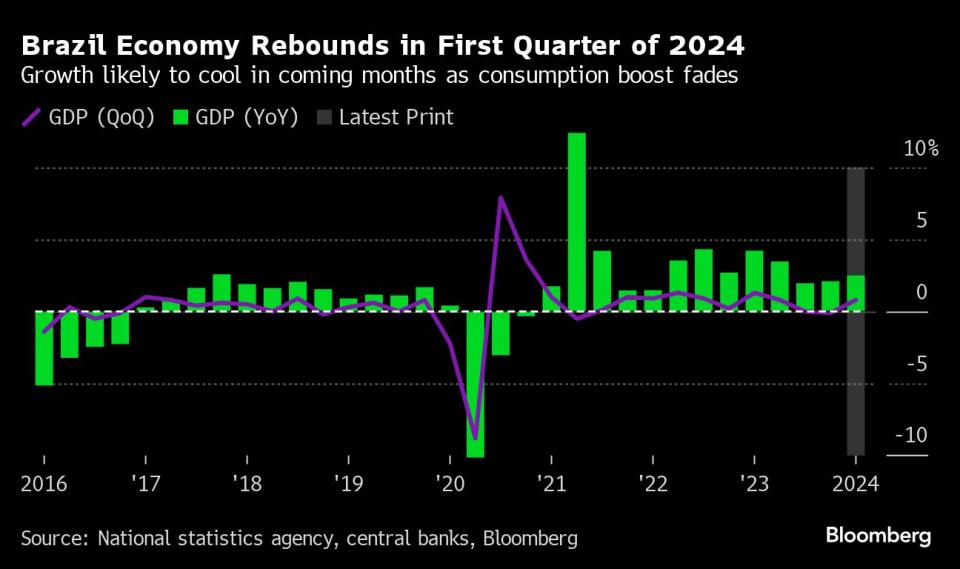Brazil’s Economic Rebound Faces Risks, Giving President Lula Reason to Worry
(Bloomberg) -- Once again, the Brazilian economy started the year with a bang, beating forecasts and giving President Luiz Inacio Lula da Silva reason to celebrate. This time around, the win is likely to be far less enduring.
Most Read from Bloomberg
Modi Vows to Retain Power Even as Party Loses India Majority
Short Sellers in Danger of Extinction After Crushing Stock Gains
Bonds Rally as Traders Reload Fed Bets After Data: Markets Wrap
BlackRock, Citadel Back Texas Stock Exchange in Challenge to NYSE
After half a year of stagnation, gross domestic product grew 0.8% in the first quarter compared to end-2023, the national statistics agency said on Tuesday. Investment, agriculture, family consumption and services posted solid gains.
Still, the growth pace was not so much the result of the economy’s underlying strength, but rather government transfers, which temporarily boost consumers’ spending power. Now the central bank is seen on the verge of pausing interest rate cuts, and the administration is hamstrung by limited spending room. Put together, the months ahead look less rosy for Lula as he already faces frustration over food prices and his response to devastating floods.
“We’re going to lose momentum more quickly than last year,” said Rafaela Vitoria, chief economist at Banco Inter SA in Belo Horizonte.
Lula celebrated Tuesday’s data as proof that family demand was again powering Latin America’s largest economy, a throwback to the consumption-led boom of his previous years in office.
Family consumption, one of the principal drivers of the period, gained by 1.5% compared to the prior three months, and investment was up 4.1%, the statistics agency said. Services grew 1.4% as consumers unloaded their extra income.
“This is one more piece of evidence that we’re heading in the right direction,” the president wrote on X following the release.
‘Very Concerned’
Many economists warn first quarter growth was likely a one-off rather than the start of robust recovery given the drag of double-digit borrowing costs.
What Bloomberg Economics Says
“Gains in household consumption and investment drove strong first-quarter GDP growth in Brazil, with a healthier composition than in past quarters. Relatively tighter financial conditions and the effects of massive floods in the southern part of the country will likely curb growth from 2Q, and add a slight downside bias to our expectation for 2024 growth of 2%.”
— Adriana Dupita, Brazil and Argentina economist
— Click here for full report
Activity was also spurred by billions of dollars the federal government injected into the economy by paying a backlog of claims, known as “precatorios,” in judicial cases it had lost. Beginning late last year, the government got caught up on 94 billion reais ($17.9 billion) worth of debts, or about the equivalent about 0.8% of GDP, according to Goldman Sachs Group Inc.
Brazilians also benefited from a 7% hike to the minimum wage that took effect in January, as well as social security disbursements. Economists say the transfers have a more limited ripple effect than last year’s agricultural boom.
While growth is likely to moderate, it’s unlikely to hit sluggish, pre-pandemic levels — especially with mid-term elections later this year, according to Alberto Ramos, chief Latin America economist at Goldman Sachs.
“President Lula is very concerned with growth and his popularity.” Ramos said. We expect him to “grease the wheels of growth moving forward,” he said.
Pinched Voters
Lula managed to achieve healthy economic expansion without budget blow-outs last year thanks in large part to what’s been dubbed the “super harvest.” Record-breaking crops like soy and corn helped the resource-rich nation outstrip analysts’ more pessimistic forecasts at the beginning of 2023.
Agriculture gained 11.3% in the first quarter of 2024, well short of last year’s highs. Industry was down 0.1%, a trend analysts expect to continue as high borrowing costs hurt manufacturing.
Voters are feeling pinched, too. Recent polls show Lula’s approval rating has slid to about 50%, the lowest of his term, as Brazilians voice concern over crime and costlier food.
At the same time he has suffered a series of defeats in Congress on his legislative initiatives.
While overall inflation cooled during the period, tight monetary policy is not expected to deliver much further relief in price growth. Meanwhile, the damage from flooding in state of Rio Grande do Sul, a farming powerhouse at accounts for about 7% of the Brazilian economy, is still being tallied up as waters there gradually recede.
The situation has left investors fretting the government will move further away from Finance Minister Fernando Haddad’s pledges to shore up public accounts.
“The risk is real,” said Thiago de Aragao, head of strategy at Arko Advice, a consulting firm. “The only way for him to regain popularity, for him to regain power in Congress, for him to become a more influential president is through expenditure.”
--With assistance from Giovanna Serafim, Robert Jameson and Bruna Lessa.
(Re-casts story, adds comments from economists and political analysts starting in fourth paragraph)
Most Read from Bloomberg Businessweek
Startup Brings New Hope to the Pursuit of Reviving Frozen Bodies
The Budget Geeks Who Helped Solve an American Economic Puzzle
Disney Is Banking On Sequels to Help Get Pixar Back on Track
©2024 Bloomberg L.P.

 Yahoo Finance
Yahoo Finance 


